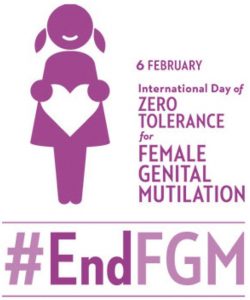By Giuliana Davis
Let’s examine the average 12-year-old girl. Having just starting understanding how men will a play a role in her life, she spends her time day dreaming over the boy she met in school. She enjoys playing with her friends, and experimenting with makeup. She shouldn’t have a care in the world, unless you consider finding a dress for her first formal to be serious business. But this is not the reality for many girls around the world. In many parts of Africa and Asia, the 12-year-old you imagine, is actually spending time preparing herself for a very invasive procedure. She can’t scream, or cry. She’ll bring shame upon herself and her family. If she doesn’t have the procedure, she’ll become a social pariah and men will discard her like a piece of garbage. Every woman she has ever known has been forced to have the procedure. It’s tradition. She’s going to be circumcised. She’ll have her labia majora, minora, and clitoris removed while fully conscious and aware. Depending on where she lives, she may also have her vaginal opening sewn shut, allowing only a small hole for urine and menstrual fluids.
This is a shocking, but very real, glimpse into the lives of thousands of girls ages 12-16 throughout 29 different countries on Earth. And while their cultures consider it to be a necessity, there is absolutely no medical benefit for this procedure. On the contrary, it often causes infection and pain that can be deadly. The most common and severe complication that occurs due to female circumcision is known as obstetric fistulae. Obstetric fistulae occur when a woman is giving birth, but the blockage caused by her sewn vaginal opening causes her to be unable to push. Labor often goes on for days, and the newborn is almost always stillborn. Due to the pressure caused by her attempts to push, and the resistance due to a sewn vaginal opening, the baby’s head presses against the soft tissues inside of the birthing canal, causing a tear between the canal and the bladder or anus. Once she has finally pushed out her stillborn baby, she’ll fall into a deep, exhausted sleep, only to wake up to the realization that she has wet the bed. Thinking it to be a one-time accident, she’ll quietly wait for it to dry, but it never will. She has completely lost control of her bladder, and will forever be incontinent.
In this culture, the incontinence caused by obstetric fistulae is worse than death. These women face a life of shame ahead of them. They are isolated and treated as pariahs, and are forced out of society. They are the Untouchables of Africa. Their husbands want nothing to do with them, and they end up living out the rest of their lives in small huts on the edge of their villages, with virtually no contact with any members of their previous cultures.
But there is hope. Many organizations are taking active roles in the fight against female genital mutilation, and aiding in the recovery of those who have undergone it and may be suffering health consequences:
- “28 Too Many”- this organization helps on 3 levels. First, they educate those in places like the U.S., who have likely never heard of the practice. Second, they educate influential members of the societies in which FGM is practiced, and encourage them to take a stand against it. And finally, they equip local people and organizations with the tools they need to oppose the practice. https://www.28toomany.org/
- “The Day of Zero Tolerance”- this is an international day introduced by the UN in an attempt to globalize the fight against FGM. Education is key, and this day makes it possible for people around the world to become educated. http://www.un.org/en/events/femalegenitalmutilationday/
- “The Desert Flower Foundation”- started by a model who escaped the world of FGM and came to the United States, the Desert Flower Foundation strives to educate people and encourages governments to pass laws that ban Female Genital Mutilation. http://www.desertflowerfoundation.org/
So while the outlook may seem bleak, there is always hope for the future when people take a stand for what they believe in. But it is essential that we don’t just watch other people do the work. Each and every person needs to become part of the fight, because as Desmond Tutu so accurately put it, “If you are neutral in situations of injustice, you have chosen the side of the oppressor. If an elephant has its foot on the tail of a mouse and you say that you are neutral, the mouse will not appreciate your neutrality.”
Giuliana Davis is a double major in Criminal Justice and Anthropology with a minor in Forensic Science. She hopes to go into the field of forensic anthropology, and her dream is to work with the Smithsonian Institute.